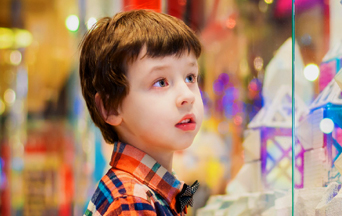
For those agonizing over what to buy this Christmas for their toddlers, the wait may be over. A panel of experts has just weighed in with suggestions targeting young children in the digital age. What do the experts say? Do they recommend a family-friendly video game that might be good fun and improve motor skills at the same time? A gender-neutral AI robot that excites the imagination and answers the endless questions of an inquisitive tot? Do they recommend any of a world of toys out there that fill virtual and non-virtual shelves with high-tech gadgets? On December 3, the American Academy of Pediatrics released a study, “Selecting Appropriate Toys for Young Children in the Digital Era.” The recommendations for the best toys for those five years or younger may surprise new i-gen parents (born after 1996) who grew up with i-phones.
Yes, Virginia, There Is a God
The Experts Weigh in
The first shock is that researchers of the “digital era” study do not recommend electronic “sensory-stimulating noise-and-light toys” or “tablet-based toys.” In fact, they claim “evidence suggests that core elements of such toys (e.g., lights and sounds emanating from a robot) detract from social engagement that might otherwise take place through facial expressions, gestures, and vocalizations and that may be important for social development.”
This is bad news for parents who are feeding their toddlers a steady diet of these small harmful screens. Studies reveal that more than 90 percent of American children have used mobile devices—many before age 1. The study reports how this heavy use of electronic media negatively affects children’s speech and language development, parental bonding and weight control.
The study’s good news is that there are alternatives … and they need not be expensive.
Gift Suggestion Categories
Here are five toy suggestions corresponding to the basic toy types. Please have in mind that all these choices are based on the latest research results and should be given due importance.
The first category of toys involves those that present symbolic or a pretend-like situation to the child. The study suggests dolls, action figures or cooking toys. Look for those things in which children can learn by putting themselves in hypothetical situations. The Catholic parent might include in this category role models toys that help children imagine themselves being or representing something virtuous.
Ellen Organ and “Her Pope”: For Such Is the Kingdom of Heaven
Another toy category seeks to develop skills that are adaptive or manipulative. These allow children to develop fine motor skills by moving, making and creating things, solving difficult problems or adapting to situations. The study authors recommend building blocks, shapes or puzzles. Parents might also consider a ball …
Another field that helps the development of the young child is that of art. Parents should expose their toddlers to ways in which they might express their creative talents. This should involve efforts to make things beautiful. Suggestions include clay and coloring. Imaginative parents might invest in crayons, colored pencils or primitive musical instruments.
The fourth toy category involves language skills and concept development. They force children to express themselves logically and correctly. The researchers recommend card games, toy letters (or numbers) and board games adjusted for their age group.
The final suggestion involves those rough and tumble toys that require gross motor skills and physical manipulation of things. These include tricycles, toy cars and other push and pull toys that challenge the child to deal with bigger problems. Parents might search for a non-digital little red wagon.
A Large Cardboard Box
These suggestions should prove more than sufficient to find the perfect gift for today’s cyber-tempted toddler. However, the researchers did mention another gift that, should all else fail, combines several of the toy categories. Give your child a large cardboard box.
Eternal and Natural Law: The Foundation of Morals and Law
“A cardboard box can be used to draw on, or made into a house,” claims co-author Dr. Alan Mendelsohn, a pediatrician at NYU Langone Health in New York. Such boxes have always sparked imagination and creativity in children who can play with them for hours on end.
The study’s authors stress that toys are not a replacement for relationships with parents. There needs to be a parental interaction with children and their toys that blends into rich experiences. Toys are instruments that should encourage “language, pretending, problem-solving, reciprocity, cooperation, and creativity.” Parents need to take them seriously.
A Spiritual Dimension
However, there is also a spiritual dimension to toys. Childhood is a time of innocence when the child develops those habits and desires that should continue into later life. It is a time when the children come to know God and His Creation; they come to desire heaven.
Through innocence, the child is always asking questions to come to know the essence and meaning of things. Children tend to see things joyfully in their perfect and ideal state as things will be in heaven. Innocence is a desire and preparation to know God by admiring His Creation. Toys should reflect this innocence. They should spark the imagination to desire marvelous and wondrous things. They should foster virtue, effort and generosity. They should ultimately lead to the love of God and a desire for heaven.
Science Confirms: Angels Took the House of Our Lady of Nazareth to Loreto
However, toys should also prepare the person to deal with the imperfect and the trials of life. Good toys teach skills to children that allow them to adapt to an imperfect world without losing their wondrous vision of God’s Creation.
This Christmas give young children gifts that keep on giving—and always package them in a large cardboard box.
As seen on CNSNews.

